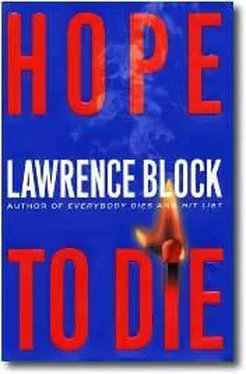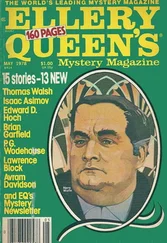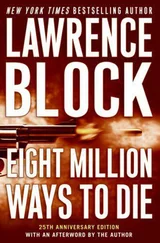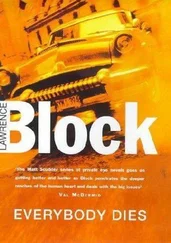And she stops, just like that. She can't see him, but did he unwittingly make a noise? Has she somehow sensed his presence?
He pushes the door open.
Her reaction is remarkable- mouth wide open, eyes big as saucers, hands rising of their own accord, about tit-high, palms out, as if to ward him off.
Her cell phone's on the dresser top, the mouthpiece shut. The answering tape ran out, he realizes. That's why she stopped herself in midsentence. When the machine cut out, she broke the connection.
"Lia!" he says, refusing to react to her reaction, letting her know how glad he is to see her, taking it for granted she's just as delighted to see him. "Lia, where've you been? I've been trying to reach you."
He keeps talking as he strides across the room toward her, and she can't say anything, can't do anything, because it would mean interrupting him in the middle of a sentence, and how can a well-brought-up girl like Lia do anything of the sort? Besides, she's hypnotized, frozen, she's the bird and he's the snake, and it's just delicious looking at her and knowing that she knows that she doesn't have a chance.
He has the little Mace canister in his hand. It's the size of a disposable lighter, and he's had it for weeks, he'd been ready to use it on Jason Bierman, but it hadn't been necessary. It probably isn't necessary now, but she might try to scratch him, she might cry out, and why take the chance? Besides, he'd really like to see just how this stuff works. He's read descriptions, but he has never seen it in action.
He presses the little button, hits her smack in the face with the spray.
And it puts her right on the ground. It's remarkable, really. She's rolling on the floor, her eyes clenched shut, her hands to her face, rubbing her eyes with the heels of her hands-
He feels a great surge of emotion. It takes him by surprise, just as the Mace took her, and the effect is almost as dramatic. He has all of this feeling for her, a feeling rather like love, or, more accurately, like what he imagines love must be like.
Eyes welling with tears, he drops to his knees and reaches for her.
The tricky part is getting her into the bathroom. It's only steps away, but someone could be out there in the hall, could see him carrying her. He can't run that risk.
Easier to finish her in her room. Tear strips from a bedsheet, fasten a noose, hang her from an overhead pipe. She's despondent, sad about her aunt's death. Why not?
Or just smash her skull with the lamp base. Someone broke in, robbed her, killed her.
But he's already put her to sleep with a choke hold, already cracked the seal on the pint of vodka and forced a few ounces down her throat.
Stay with the plan, he tells himself.
He opens her door, checks the hallway. He steps out alone, knocks on the closed bathroom door, opens it when there's no response. The room is empty.
He comes back for her. Using a handkerchief, he wipes down the room for fingerprints. That done, he gets her to her feet, checks the hallway again, then half-drags, half-carries her out of her room and into the bathroom. As soon as they're inside he closes and locks the door.
He puts the stopper in the tub, turns the faucets. While the water runs he stretches her out on the cold tile floor, kneels beside her. He undresses her, strips her to her skin, delighted as her slender body reveals itself to him. Like a Christmas present, he thinks, and sees himself as a willful child, smashing and discarding his toy before he or anyone else has a chance to play with it.
He smiles at the metaphor.
When she is naked and the tub full to a depth of about ten inches, he slips one arm under her thighs and the other under her shoulders and lifts, then lowers her into the tub. He grabs her blond hair with one hand, puts the other on her chest, his fingers spread out so that he is touching both her small breasts at once. He presses down, holding her head under water.
Her eyes are open, staring up through the water. Can she see him? Does she know what's happening?
Does it matter?
He holds her like that, drinking in the sight of her, until bubbles come out of her mouth and nose. He presses down on her chest and more bubbles emerge, float to the surface. And her eyes change. Something has gone out of them.
He takes a deep breath, lets it out. He lets go of her hair, and her head remains beneath the water's surface. He gives her breasts a last little squeeze, lets his hand trail down to her loins. He parts her thighs, slips a finger just the tiniest bit into her, then withdraws it, wondering briefly what impulse prompted the act.
No matter. He folds her clothes, stacks them neatly on the closed commode. He uses his handkerchief again, wiping any surfaces he may have touched.
He sees no one on his way out of the apartment. He takes the stairs again, and passes no one on his way through the lobby. There are a few people on the street, but nobody gives him a second glance.
It is not until he is on the elevated platform again, waiting for the train, that he takes the business card from the breast pocket of his blue shirt. He found it on her dresser, next to the cell phone, and read it then, but he reads it again now.
Matthew Scudder, he reads, and nods to himself, and puts the card back in his shirt pocket.
If I'd gone straight home I might have been there when she called, but maybe not. It's hard to say.
And it's moot, because I didn't go straight home. I stopped across the street, watching CNN while T J booted up the computer and searched for Jason Bierman. There were already several Web sites devoted wholly or in part to the massacre on West Seventy-fourth, and he read out several bits of arcana to me, including the report of one incisive fellow who'd paced off the precise distance from the Hollanders' home to the spot in front of the Dakota where John Lennon was shot.
I said, "How many more steps to the grassy knoll? That's what I want to know."
"Here's somethin' else," he said. "His mama says he didn't do it."
So had Oswald's, I told him, and how was that for coincidence? On the TV, Lynne Russell smiled bravely through a report of bad news from the Balkans and worse news from the Middle East. I turned her off when they went to a commercial and called Elaine at her shop. We arranged to meet for an early dinner at Armstrong's. I asked T J if he wanted to join us, but he said he had things to do.
I left him hunched over his Mac and went across the street. I collected the mail and took it upstairs, sorted it, and didn't find anything exciting. I checked the messages, and there was one from Lia Parkman, a disjointed, rambling riff in which she apologized for not having told me earlier that she could recall a conversation involving her Aunt Susan. It had been with a graduate student who was doing a doctoral dissertation on her writing. His name was Arden Brill. She went on to say I could call her, that I had her number, and then the machine cut her off in the middle of a sentence.
But I didn't have her number, T J had her number, and when I called him his line was busy. I tried his cell phone and he picked up, checked the number, and read it off to me. I dialed it and it rang four times, and then a recorded voice told me I'd reached Sprint voice mail, and invited me to leave a message for- and another recorded voice, hers, said, "Lia Parkman."
I decided I'd try her later, and rang off without leaving a message.
I took a shower and decided I didn't need to shave again, and after I got dressed I tried Lia's number again, with the same results. I watched the news some more, tried Lia a third time on my way out the door, and walked a long block west to Tenth Avenue, where Jimmy Armstrong keeps a saloon. I went in and got a Perrier at the bar, turning when I heard my name called. The man on his feet beckoning to me was Manny Karesh, a friend from the old days, when Jimmy's joint was on Ninth Avenue, just around the corner from my hotel.
Читать дальше












